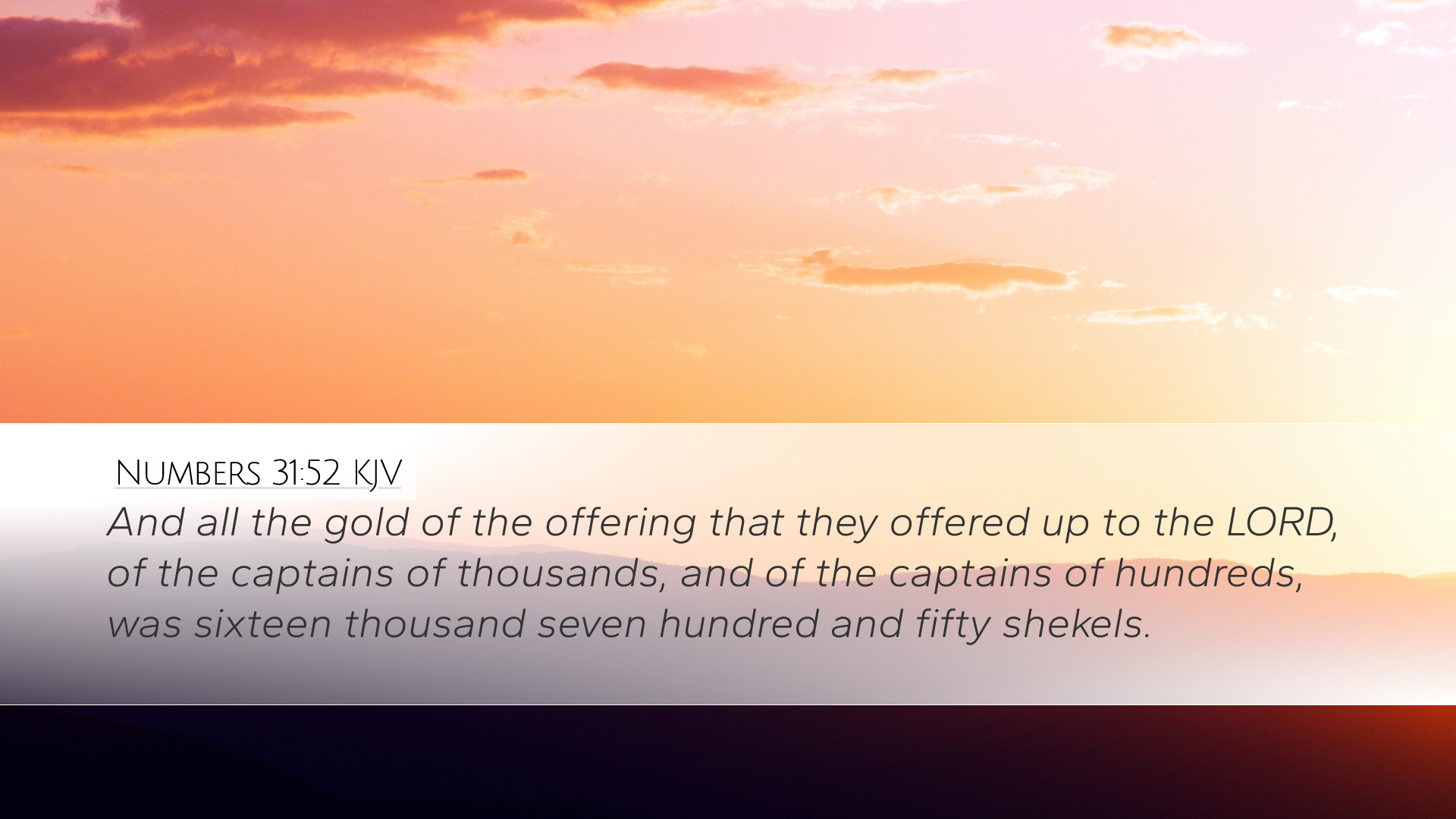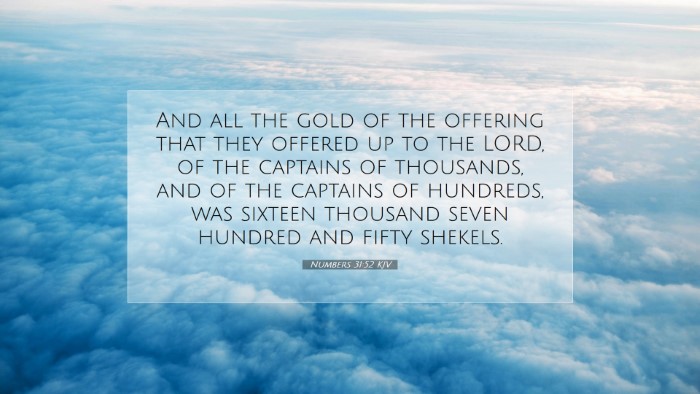Commentary on Numbers 31:52
Verse Analysis: Numbers 31:52 states, “And all the gold of the offering that they offered to the Lord, of the captains of thousands, and of the captains of hundreds, was sixteen thousand seven hundred and fifty shekels.” This verse reveals critical insights regarding the value, purpose, and attitude towards offerings in service to God.
Contextual Background
The Book of Numbers is set in the wilderness during Israel's journey towards the Promised Land. In Chapter 31, we observe God’s judgments and commands related to warfare against the Midianites. This event signifies not just military action, but also divine justice against idolatry and immorality that the Midianites represented.
The Offering and Its Significance
This verse is significant within the context of the larger narrative, especially regarding the dedication of the spoils of war. The offering of gold is not merely an element of wealth but represents the acknowledgment for God's favor and involvement in the Israelite victories. The gold, totaling 16,750 shekels, is a symbol of both gratitude and consecration to the Lord.
Insights from Commentaries
- Matthew Henry: Henry emphasizes the notion that the offering by the captains symbolizes a proper response to divine blessings. He notes that the offering was made willingly and with a heart of gratitude. He comments that in every victory, acknowledgment of God's hand in success is vital for spiritual integrity.
- Albert Barnes: Barnes discusses the dual aspect of offerings, which includes both the material and spiritual dimensions. He points out that the requirement to give of the spoils reflects a broader principle in worship — that nothing should be regarded as entirely one’s own when it is acquired through God’s providence and grace. He elaborates that while the men could have kept the spoils, they chose to honor God, showcasing allegiance and faithfulness.
- Adam Clarke: Clarke highlights the significance of the amount mentioned — 16,750 shekels — noting its representation of both wealth and responsibility. Clarke suggests that the number can also symbolize completeness in God’s economy, encouraging us to view our offerings in a relational context with God rather than solely transactional. He further remarks that all offerings should reflect back to God's attributes and His faithfulness to His people.
Theological Implications
Numbers 31:52 opens a conversation surrounding stewardship and the theology of giving. Each commentary underscores the principle that our offerings to God should be seen through the lens of gratitude and acknowledgment of His lordship over every area of life. As students and scholars reflect on this text, several key theological themes emerge.
1. Divine Sovereignty and Human Responsibility
This passage exemplifies the relationship between God’s sovereignty in providing victory and the Israelite’s responsibility to respond appropriately. The acknowledgment of God through offerings becomes a tangible way for the community to express faith and loyalty, emphasizing that human effort is intertwined with divine providence.
2. The Nature of Worship
A critical takeaway from the passage is that worship is not merely about ritual or tradition but rather reflects the heart’s condition. True worship necessitates a response to God’s work in our lives which, in this context, is represented through tangible offerings. Appreciation for spiritual victories prompts practical expressions of worship.
3. Community and Accountability
The involvement of captains, representing collective unity, indicates the importance of communal responsibility in spiritual matters. Faith-based leadership should encourage an environment where collective offerings are made, exemplifying that discipleship and stewardship are not solely individual performances, but communal commitments.
Practical Applications
For pastors, students, and theologians, Numbers 31:52 serves as a compelling reminder of the need to cultivate a lifestyle of gratitude and stewardship in practical terms. Here are some applications to contemplate:
- Gratitude in Leadership: Church leaders are challenged to model an attitude of gratitude in their congregations, guiding them towards recognizing God’s blessings and responding through offerings of time, talent, and treasure.
- Encouraging Generosity: This passage can inform preaching about the importance of financial offerings during worship, not merely as a duty but as a vital expression of trust and reverence.
- Community Engagement: Foster a church environment that emphasizes collective commitments to missions and outreach, paralleling the army’s intent to dedicate spoils to God, thus maximizing impact through shared resources.
Conclusion
Numbers 31:52, through its portrayal of the captains’ offerings, profoundly illustrates the necessary intersection of divine authority, human participation, and communal expression. The commentaries by Henry, Barnes, and Clarke collectively enhance our understanding of this passage, revealing profound truths about worship, stewardship, and the nature of our relationship with God. As believers reflect on these insights, may they be inspired to devote their lives and offerings to reflect God’s glory and goodness in every aspect.


